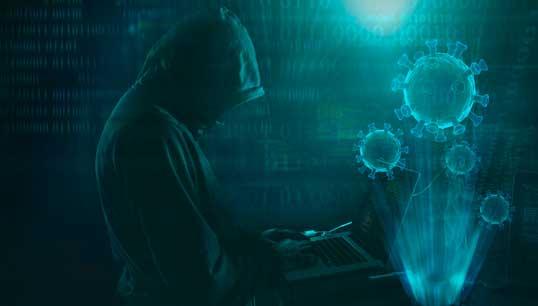
The maritime and offshore sectors are coming under considerable pressure from cyber criminals since the outbreak of coronavirus with a 400% increase in attempted hacks since February 2020, according to cyber security specialist Naval Dome.
There has been an increase in malware, ransomware and phishing emails exploiting the Covid-19 crisis.
Travel restrictions, social distancing measures and economic recession brought on by the pandemic are beginning to bite into companies' ability protect themselves from cyber attack.
'Companies are stretched thin and this is benefitting the hacker,' Naval Dome chief executive Itai Sela said.
The global crisis and social distancing measures are preventing technicians flying out to ships and rigs to upgrade and service critical operating systems, resulting in established security protocols being circumvented, leaving businesses open to attack.
'As budgets are cut and in the absence of service engineers, we are seeing ship and offshore rig staff connecting their OT systems to shoreside networks, at the behest of Original Equipment Manufactuer vendors (OEMs), for brief periods of time to carry out diagnostics and upload software updates and patches themselves.
'This means that their IT and OT systems are no longer segregated and individual endpoints, critical systems and components may be susceptible. Some of these are legacy systems which have no security update patches and are even more susceptible to cyber attack.
'The increase in OEM personnel working remotely on home networks and personal PCs, which are not well protected, adds to the problem.'
During the first three months of 2020, attacks targeting home workers increased tenfold, according to Naval Dome. While PC security software provider McAfee has reported that that between January and April cloud-based cyber-attacks on all businesses increase by 630%.
The economic downturn and the drop in the price of crude oil is also having an effect, with oil companies and contractors being faced with limited budgets available to implement effective cyber security measures.
'Companies are stretched thin and this is benefitting the hacker,' said Mr Sela.
Ido Ben-Moshe, vice president business development, said the problem is particularly acute in the marine and offshore oil and gas sectors. 'If hackers penetrate networks, and critical equipment is exposed there could be significant safety, downtime, financial and potential reputational damage.'
Naval Dome is a cyber security specialist has been awarded Security Level 4 Certification from classification society DNV GL.
Tags
More articles
Keep safe online at sea during the pandemic
Maritime crew warned about scammers cashing in on Covid-19
Seafarers are warned to be on their guard against coronavirus scammers.
Superyacht crew welfare toolkit fundraiser motors into life
Research highlighting mental health challenges faced by superyacht crew will soon result in a dedicated online yacht help 'toolkit' being created by the International Seafarers' Welfare and Assistance Network (ISWAN).
Red flag raised following fatal elevator accident
Australian authorities have expressed concern about the number of accidents involving ship elevator systems following an investigation into a fatal incident onboard a containership off the country's coast.
Union calls time on governments using 'force majeure' to mask failures in pandemic response
National governments can no longer hide behind a declaration of 'force majeure' in order to mask failures in their pandemic response which have resulted in thousands of seafarers being stuck at sea well beyond their contractual obligations.
Yacht in Greenland grounding was poorly prepared for polar navigation, finds flag state
Isle of Man marine authorities are calling for vessels in remote areas to take more care, following a case in which a 1,076gt superyacht ran aground at a speed of 14.5 knots in sensitive polar waters.
Maritime Skills Academy gains MCA approval for STCW online training
The Maritime Skills Academy has gained Maritime & Coastguard Agency (MCA) approval to run four of its STCW courses by webinar.
